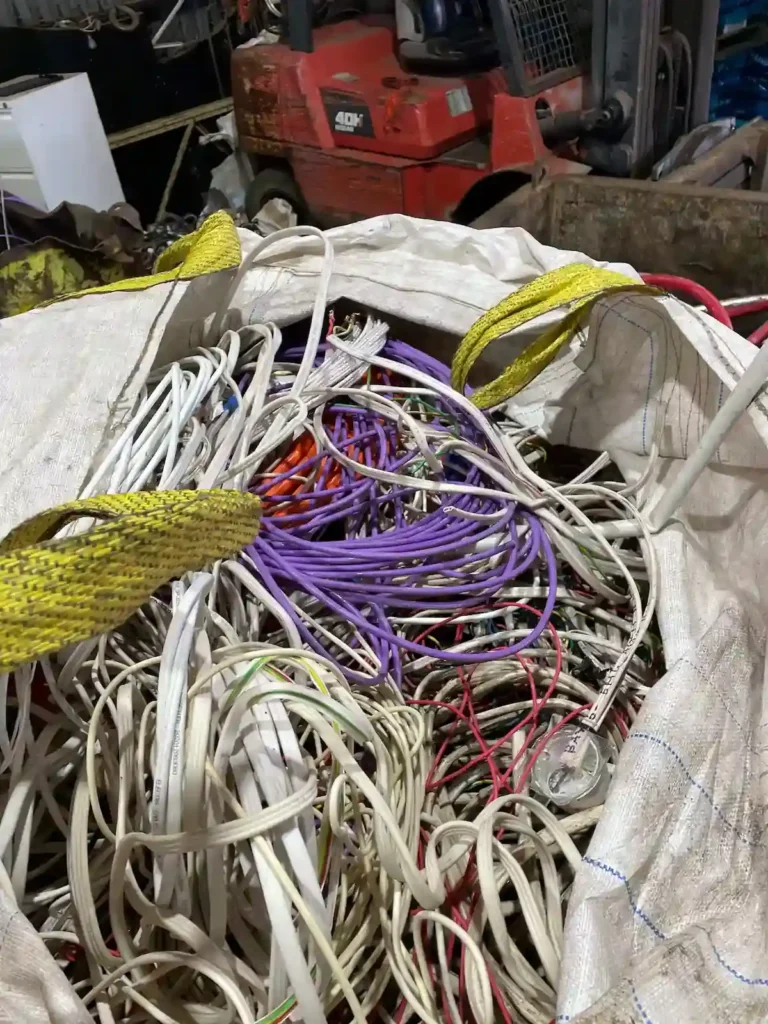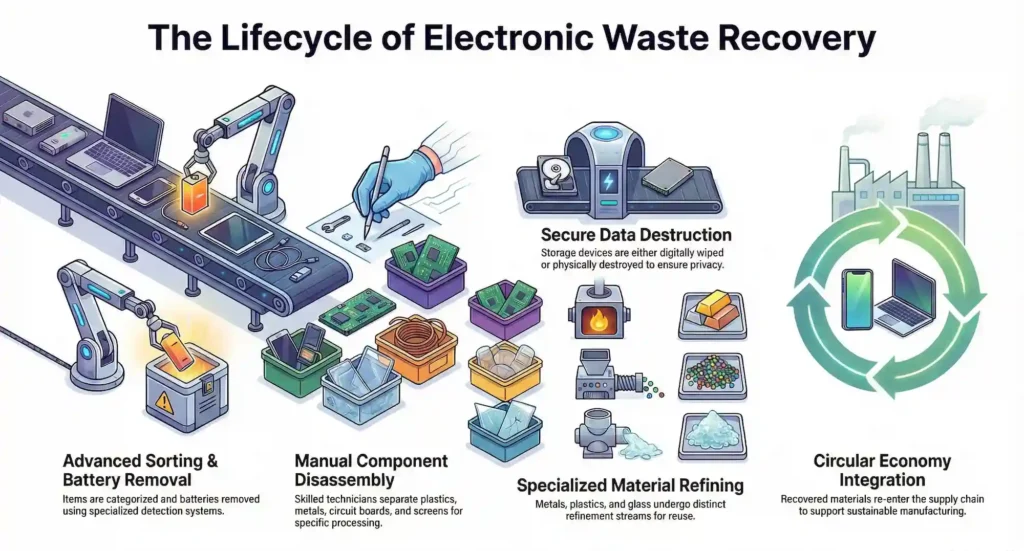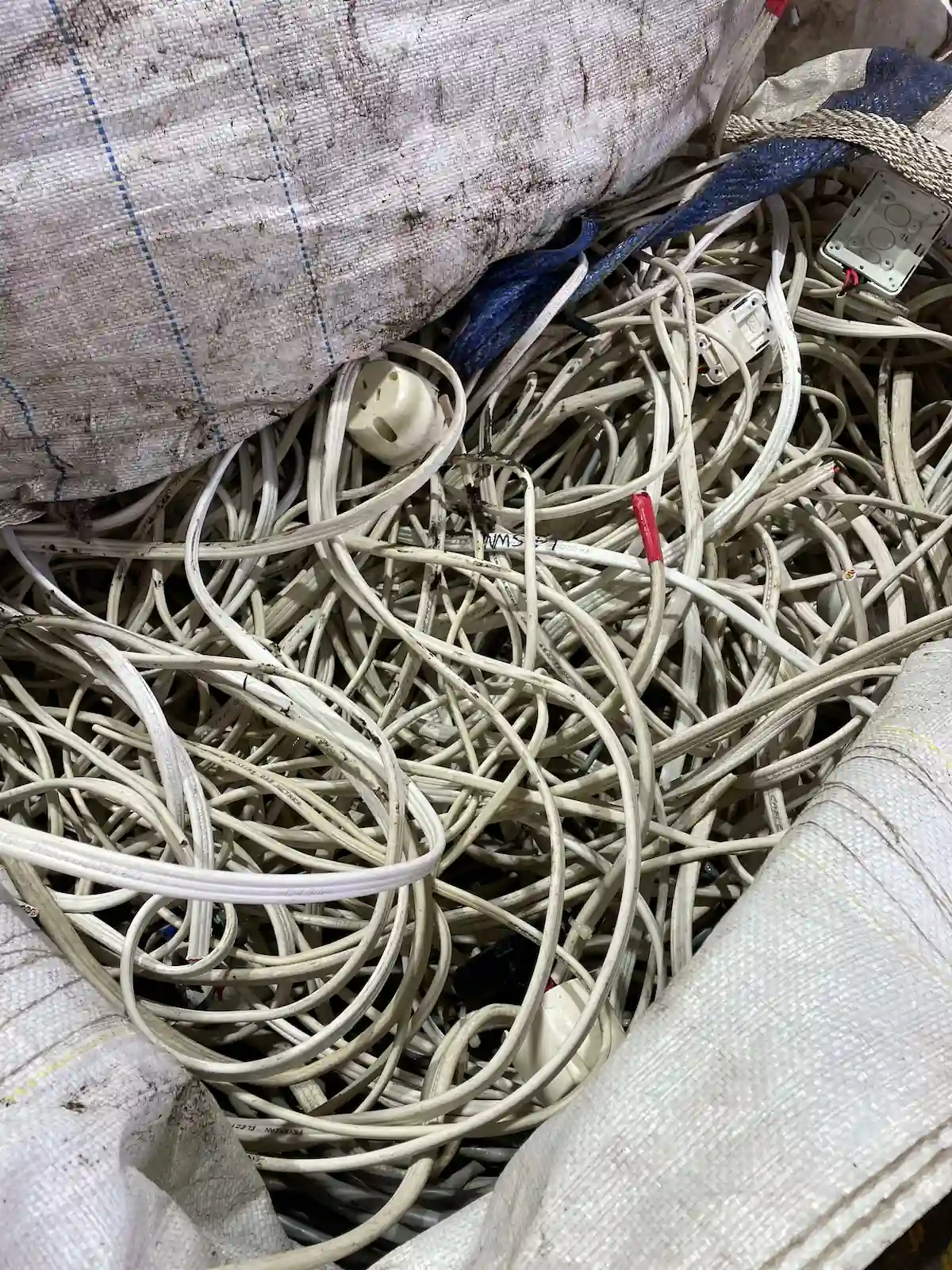What Counts as E-Waste and Why It Matters
E-waste includes any item with a plug, battery, or circuit board—such as TVs, laptops, microwaves, light globes, batteries, and CDs. According to the Global E-Waste Monitor by the United Nations University, only a small percentage of electronic waste is formally recycled, with the majority sent to landfill worldwide.
Improper disposal releases hazardous substances like mercury, lead, and cadmium into soil and waterways. At the same time, e-waste recycling recovers valuable materials including copper, aluminium, gold, cobalt, and lithium—reducing the need for virgin mining.
Understanding waste streams is essential. For broader household sorting rules, see
Waste Classification Guidelines.

How to Dispose of Specific E-Waste Items
Different electronics require different disposal methods. Whether you’re searching for how to dispose of bulbs, how to discard batteries, or how to get rid of old TV units, the table below outlines safe options for e-waste recycling near me in Newcastle and Lake Macquarie.
| E-Waste Item | Why Proper Disposal Matters | Where to Dispose | Key Pre-Disposal Steps |
| Fluorescent & LED Bulbs | They contain small amounts of mercury or other hazardous substances. Incandescent light bulbs are sometimes okay for general waste—check your council. | Local council e-waste drop-off points; waste/transfer centres; RubbishGo (home or business collection) | Handle gently; don’t break; if broken, ventilate, wear gloves; wrap in protective packaging; label as light bulbs. |
| Household & Car Batteries | Contain acid, lead, lithium etc.—risk of leaks, fire, contamination. | “B-cycle” or equivalent battery drop-off bins in major retailers; council resource recovery centres; RubbishGo can collect. | Tape terminals; store upright; separate from other waste; avoid damage; for car batteries, heavy, ensure safe transport. |
| CDs & DVDs | Mixed materials (plastic, metal) that don’t break down safely in landfill. | Specialist e-waste recyclers; drop-off centres; sometimes at audio/video or tech stores. | Remove paper/cardboard covers; clean surface; check the centre accepts CDs/DVDs. |
| Old Laptops & Computers | Valuable metals + potential data privacy issues; many hazardous components inside. | NTCRS-approved drop-off sites for computers/IT; tech stores; RubbishGo’s e-waste recycling service. | Back up data; wipe drives securely; remove or disable storage if required; unplug and safely transport. |
| Microwaves & Small Appliances | Contain electrical circuits, metal, maybe hazardous components—can’t just go in regular bins. | Council large appliance collection; e-waste drop-off points; RubbishGo’s collection services. | Unplug; remove plug if detachable; empty; ensure no food remains; wrap cords; transport safely. |
| Old TVs (CRT / Flat-screen) | CRT TVs have heavy glass and sometimes lead; flat screens may have mercury or other toxic elements; large, bulky. | National Television & Computer Recycling Scheme (NTCRS) drop-off points; local council or specialised e-waste collectors. | Handle with care; use two people; package or pad to avoid breakage; disconnect; determine type (CRT or LCD) since rules may differ. |
For households and businesses in Newcastle and Lake Macquarie, e-waste removal is typically handled through licensed collection services, especially for bulky items like TVs, computers, and batteries that councils don’t accept in regular bins.
How to Protect Your Data Before Recycling Electronics
Before recycling electronics, safeguard your personal data:
- Back up files and securely wipe hard drives
- Remove USBs, SD cards, and SIM cards
- Factory reset phones and tablets
- Use professional recyclers with certified data destruction
RubbishGo partners only with facilities that prioritise data security through drive wiping or shredding.
What Happens to E-Waste at a Recycling Facility?

After the e-waste drop-off, electronics go through a structured recycling process:
Collection & Sorting
- Items are sorted, and batteries are removed using advanced detection systems.
Manual Disassembly
- Components such as plastics, metals, circuit boards, and screens are separated.
Material Recovery
- Metals are refined for reuse
- Plastics are reprocessed into raw materials
- Glass is recycled through specialist streams
Secure Data Destruction
- Storage devices are wiped or physically destroyed.
Reuse & Manufacturing
- Recovered materials re-enter the supply chain, supporting a circular economy.
Electrical Recycling Bins Near Me
Many local councils offer designated drop-off facilities for safely recycling electronic items. The table below outlines key locations and the types of e-waste accepted at each site.
| Location | Address | What They Accept & Services |
| Buttonderry Waste Management Facility | Hue Hue Rd, Jilliby (Central Coast) | One of the drop-off sites for e-waste for Central Coast Council. Unlimited drop-off of household e-waste (corded items like computers, printers, TVs etc.), free of charge. |
| Woy Woy Waste Management Facility | Nagari Rd, Woy Woy (Central Coast) | Another site for free e-waste drop-off under the Council’s scheme. |
| Awaba Waste Management Facility | 367 Wilton Rd, Awaba, NSW 2283 | computers & accessories, TVs, batteries (single-use & rechargeable), mobile phones, fluorescent/LED lights, electrical appliances. |
Programs such as Lake Macquarie Council’s light globe recycling, fluorescent, and LED help divert hazardous waste from landfill.
Why Choose RubbishGo for Local E-Waste Recycling
RubbishGo offers reliable electronic waste disposal services across Newcastle, Lake Macquarie, and the Central Coast.
Why locals choose us:
- Licensed e-waste collection Newcastle services
- Residential and commercial solutions
- Environmentally responsible processing
- Door-to-door convenience
For businesses managing larger waste streams, specialised e-waste disposal solutions for offices and commercial sites can ensure compliance, data security, and responsible recycling.



